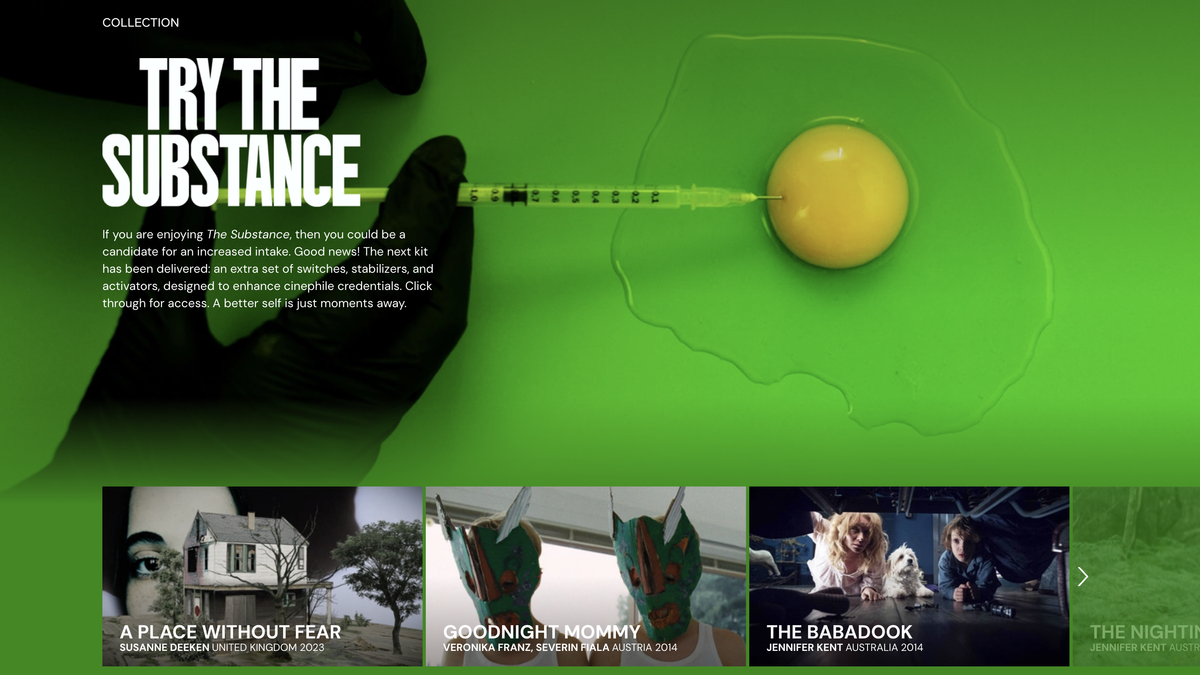I’m bored of the best streaming services. Or, more accurately, I’m overwhelmed by them. Which, let’s face it, has become boring.
Take Disney Plus, for example. The options that appeal to me right now range from rewatching The X-Files in its entirety to a marathon of all the Star Wars movies in order (yes, even the prequels). Or maybe a documentary about a friendly-looking otter, another about a shark-infested beach, the latest blockbuster superhero movie everyone’s talking about, the latest scary movie everyone’s talking about, or the latest drama everyone’s talking about. Just listing these choices feels exhausting.
And that’s only one platform. Every service promises endless entertainment, yet more often than not, I find myself endlessly scrolling instead of actually watching anything. Enter Mubi, a streaming service that feels refreshingly different. This year, Mubi became my favorite subscription, and here’s why.
What is Mubi?
Let’s cover the basics first. Mubi is a streaming platform dedicated to films – you will find some film-length documentaries too, but not many. Unlike other services that have thousands of titles, Mubi takes a ‘handpicked’ approach. Its carefully curated catalog features iconic classics and acclaimed recent releases through to experimental, indie, and international gems you’d struggle to find on most other platforms.
Mubi costs $14.99 / £11.99 / AU$14.99 per month. Alternatively, you can save 33% by paying $119.88 / £95.88 / AU$119.88 annually, which works out to $9.99 / £7.99 / AU$9.99 per month. Students can get a discounted rate of $9.99 / £7.99 / AU$8.99 per month. This subscription lets you stream on up to five devices, with two simultaneous streams allowed at a time. You can also download films to your iOS or Android device for offline viewing – a lifesaver for flights or commuting.
There’s also Mubi Go, a subscription add-on that includes a free cinema ticket each week to watch a Mubi-picked film at participating cinemas and theaters. This bumps up the price to $19.99 / £18.99 / AU$19.99 a month.
1. It feels like an education in cinema
I love movies, but I’ve often felt I lacked the knowledge and breadth of exposure to truly appreciate cinema. That’s one of my favorite aspects of Mubi, it makes me feel like I’m growing as a movie lover.
Its curated mix of genres, styles, and perspectives pushes me out of my comfort zone, serving up films from indie gems to restored classics and experimental works from all over the globe that I wouldn’t have discovered otherwise.
But I like that Mubi doesn’t just show me these new films, it guides me through them. There are mini-reviews alongside each title called “Our Take” that highlight what makes these movie choices special. There’s also Mubi’s Notebook blog, which provides context, interviews, and criticism.
I also love exploring Mubi’s “Collections,” these are films that have been grouped by cinematic themes, like “You Up? Midnight Movies”, which Mubi says are erotically charged movies about vice and excess. Or “Modern Lovers”, which are complex romantic stories without cliches. Or even “A Woman’s Bite: Female Vampires,” which should be self-explanatory.
In the past, I’d watch a movie one day then choose a completely different genre the next. With “Collections,” it’s sort of like I’m attending a mini film school and I’m immersing myself into a different theme each week.
2. It’s a treasure trove of exclusives, restorations and hidden gems
Mubi isn’t just a streaming platform, it’s also a film distributor. This means that festival hits like Perfect Days, The Worst Person in the World and more recently The Substance, arrive on the platform so you can stream them shortly after they’ve been shown at cinemas and movie theaters – more often than not, they stay there exclusively.
You’ll also find rare gems and restorations, like the recent 4K update of Tarsem Singh’s cult classic The Fall. This mix of new, classic, and obscure titles feels like uncovering a constant stream of cinematic treasures.
To make the platform feel even more exclusive, like you’re being ushered to great new titles by your own film expert, you can also pay a little more for Mubi Go, which offers a cinema ticket each week for a specific film. Unfortunately, I couldn’t try it this year since there’s no participating cinema near me, but it’s a brilliant add-on for serious cinephiles.
3. The user experience is simple and visually stunning
With its clean layout, white background, and striking banners, browsing feels thoughtfully designed and refreshingly straightforward. Granted, it’s not too dissimilar from the grid-like layout of other streaming services, but it feels like Netflix if an incredibly hip Scandi design agency got its hands on it.
The search functionality on Mubi is simple yet effective, letting you explore by genre, country, year, awards, or filmmaker. While I’d love a few more advanced filtering options, Mubi’s simplicity is part of its charm. User-created lists, like “Mubi Top 1000” or “Essential French Films,” add a sense of being involved in a broader film-loving community, too, and you can also rate movies after you’ve seen them.
The platform also offers features that make watching and engaging with film easier, like offline viewing for iOS and Android devices, quick access to your viewing history, and a gifting option – this allows you to share some Mubi titles with a handful of people after you’ve watched them, a great way to give your friends a taste of Mubi without them subscribing.
4. It’s the perfect choice for decision fatigue
Mubi feels like stepping into a curated art gallery for films. Unlike other platforms that are overloaded with thousands of titles, its carefully chosen catalog makes every choice feel purposeful.
Sure, there are still hundreds of movies here, but the way recommendations are tailored to my viewing habits is different – more complementary and thoughtful, rather than just similar. To me, it feels like having a cinema-savvy friend hand-pick my watchlist.
Mubi’s curation has also made me a more adventurous viewer, introducing me to international gems, restored classics, and bold indie debuts I’d probably never have even thought to seek out otherwise. It’s helped me see cinema in a whole new way.
Read the full article here














